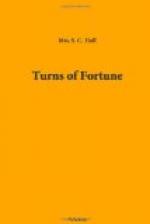“And Rose,” said Helen, in a quiet voice, “did you really think I ever intended to marry Edward Lynne?”
“Certainly, cousin. Why, you love him, do you not! Besides, he is rich—very rich in comparison to you—very, very rich. And if he were not—oh, Helen!—is he not in himself—but I need not reason—you are in your usual high spirits, and say what you do not mean.”
“I do not, Rose, now, at all events. Last evening, Edward was so earnest, so affectionate, so very earnest, it is pleasant to have a true and faithful lover; but I should not quite like to break his heart—it would not be friendly, knowing him so long; for indeed,” she added, gaily, “though I don’t like Edward Lynne well enough to marry him, I like him too well to break his heart in downright earnest.”
There are women cold and coquettish by nature. The disposition flourishes best in courtly scenes, but it will grow anywhere, ay, and flourish anywhere. It unfortunately requires but little culture; still Helen was in her novitiate. If she had not been so, she would not have cared whether Edward broke his heart or not.
“But Helen,” stammered Rose, “surely—you—you have been very wrong.”
“I know it—I know—there, don’t you hear me say I know it, and yet your lecturing face is as long as ever. Surely,” she continued pettishly, “I confess my crime; and even Mr. Stokes says, when confessed it is amended.”
“Helen!” exclaimed Rose suddenly; “Helen!—if what you have now said is really true, you have only told me half the truth. Helen Marsh, you have seen some one you like better than Edward Lynne.”
“No!” was Helen’s prompt reply, for she would not condescend to a falsehood—her own pride was a sufficient barrier against that. “No, Rose, I have not seen any one I like better than Edward. But, Rose”—She buried her face in her hands, and as suddenly withdrew them, and shaking back her luxuriant ringlets, while a bright triumphant colour mounted to her cheeks, added—“There is no reason why I should be ashamed. I saw, last week, at Mrs. Howard’s, one whom I would rather marry.”
“I always thought,” murmured Rose, weeping in the fulness of her generous nature, as the idea of Edward’s future misery came upon her—“I always thought no good would come of your visiting a lady so much above us.” It would be impossible to describe the contemptuous expression of Helen’s finely moulded features, while she repeated, as if to herself, “Above us!—above me!” And then she added aloud, and with what seemed to Rose a forced expression of joy, “But good will come of it, Rose—good will surely come of it; never fear but it will—it must. And when I am a great lady, Rosey, who but you, sweet cousin, will be next my heart?”
“I am satisfied to be near, even without being next it, Helen,” she replied mournfully; “but why have you kept this matter concealed from me so long? Why have you”—




